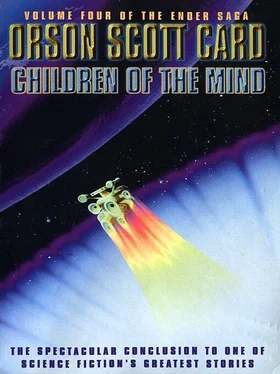Orson Card - Children of the Mind
Здесь есть возможность читать онлайн «Orson Card - Children of the Mind» весь текст электронной книги совершенно бесплатно (целиком полную версию без сокращений). В некоторых случаях можно слушать аудио, скачать через торрент в формате fb2 и присутствует краткое содержание. Жанр: Фантастика и фэнтези, на английском языке. Описание произведения, (предисловие) а так же отзывы посетителей доступны на портале библиотеки ЛибКат.
- Название:Children of the Mind
- Автор:
- Жанр:
- Год:неизвестен
- ISBN:нет данных
- Рейтинг книги:3 / 5. Голосов: 1
-
Избранное:Добавить в избранное
- Отзывы:
-
Ваша оценка:
- 60
- 1
- 2
- 3
- 4
- 5
Children of the Mind: краткое содержание, описание и аннотация
Предлагаем к чтению аннотацию, описание, краткое содержание или предисловие (зависит от того, что написал сам автор книги «Children of the Mind»). Если вы не нашли необходимую информацию о книге — напишите в комментариях, мы постараемся отыскать её.
Children of the Mind — читать онлайн бесплатно полную книгу (весь текст) целиком
Ниже представлен текст книги, разбитый по страницам. Система сохранения места последней прочитанной страницы, позволяет с удобством читать онлайн бесплатно книгу «Children of the Mind», без необходимости каждый раз заново искать на чём Вы остановились. Поставьте закладку, и сможете в любой момент перейти на страницу, на которой закончили чтение.
Интервал:
Закладка:
"Miro's right," said Quara, pouncing. Miro winced. He hated being on Quara's side, because now everybody's annoyance with her would rub off on him. "Either the cows are already out of the barn, so why bother shutting the door, or they can't get the door open anyway, so why put a lock on it?"
"What do you know about cows?" asked Ela disdainfully.
"After all these years of living and working with you," said Quara nastily, "I'd say I'm an expert."
"Girls, girls," said Jane. "Get a grip on yourselves."
Again, everyone but Miro turned to her in surprise. Val wouldn't have spoken up during a family conflict like this; nor would the Jane they knew -- though of course Miro was used to her speaking up all the time.
"We all know the risks of giving them information about us," said Miro. "We also know that we're making no headway and maybe we'll be able to learn something about the way this language works after having some give and take."
"It's not give and take," said Jane. "It's give and give. We give them information they probably can't get any other way, information that may well tell them everything they need to know in order to create new viruses that might well circumvent all our weapons against them. But since we have no idea how that information is coded, or even where each specific datum is located, how can we interpret the answer? Besides, what if the answer is a new virus to destroy us?"
"They're sending us the information necessary to construct the virus," said Quara, her voice thick with contempt, as if she thought Jane were the stupidest person who ever lived, instead of arguably the most godlike in her brilliance. "But we're not going to build it. As long as it's just a graphic representation on a computer screen --"
"That's it," said Ela.
"What's it?" said Quara. It was her turn to be annoyed now, for obviously Ela was a step ahead of her on something.
" They aren't taking these signals and putting them up on a computer screen. We do that because we have a language written with symbols that we see with the naked eye. But they must read these broadcast signals more directly. The code comes in, and they somehow interpret it by following the instruction to make the molecule that's described in the broadcast. Then they 'read' it by -- what, smelling it? Swallowing it? The point is, if genetic molecules are their language, then they must somehow take them into their body as appropriately as the way we get the images of our writing from the paper into our eyes."
"I see," said Jane. "You're hypothesizing that they're expecting us to make a molecule out of what they send us, instead of just reading it on a screen and trying to abstract it and intellectualize it."
"For all we know," said Ela, "this could be how they discipline people. Or attack them. Send them a message. If they 'listen' they have to do it by reading the molecule into their bodies and letting it have its effect on them. So if the effect is poison or a killing disease, just hearing the message subjects them to the discipline. It's as if all our language had to be tapped out on the back of our neck. To listen, we'd have to lie down and expose ourself to whatever tool they chose to use to send the message. If it's a finger or a feather, well and good -- but if it's a broadaxe or a machete or a sledgehammer, too bad for us."
"It doesn't even have to be fatal," said Quara, her rivalry with Ela forgotten as she developed the idea in her own mind. "The molecules could be behavior-altering devices. To hear is literally to obey."
"I don't know if you're right in the particulars," said Jane. "But it gives the experiment much more potential for success. And it suggests that they might not have a delivery system that can attack us directly. That changes the probable risk."
"And people say you can't think well without your computer," said Miro.
At once he was embarrassed. He had inadvertently spoken to her as flippantly as he used to when he subvocalized so she could overhear him through the jewel. But now it sounded strangely cold of him, to tease her about having lost her computer network. He could joke that way with Jane-in-the-jewel. But Jane-in-the-flesh was a different matter. She was now a human person. With feelings that had to be worried about.
Jane had feelings all along, thought Miro. But I didn't think much about them because ... because I didn't have to. Because I didn't see her. Because she wasn't, in a sense, real to me.
"I just meant ..." Miro said. "I just mean, good thinking."
"Thank you," said Jane. There wasn't a trace of irony in her voice, but Miro knew the irony was there all the same, because it was inherent in the situation. Miro, this uniprocessing human, was telling this brilliant being that she had thought well -- as if he were fit to judge her.
Suddenly he was angry, not at Jane, but at himself. Why should he have to watch every word he said, just because she had not acquired this body in the normal way? She may not have been human before, but she was certainly human now, and could be talked to like a human. If she was somehow different from other human beings, so what? All human beings were different from all others, and yet to be decent and polite, wasn't he supposed to treat everyone basically alike? Wouldn't he say, "Do you see what I mean?" to a blind person, expecting the metaphorical use of "see" to be taken without umbrage? Well, why not say, "Good thinking," to Jane? Just because her thought processes were unfathomably deep to a human didn't mean that a human couldn't use a standard expression of agreement and approval when speaking to her.
Looking at her now, Miro could see a kind of sadness in her eyes. No doubt it came from his obvious confusion -- after joking with her as he always had, suddenly he was embarrassed, suddenly he backtracked. That was why her "Thank you" had been ironic. Because she wanted him to be natural with her, and he couldn't.
No, he hadn't been natural, but he certainly could.
And what did it matter, anyway? They were here to solve the problem of the descoladores, not to work out the kinks in their personal relationships after the wholesale body swap.
"Do I take it we have agreement?" asked Ela. "To send messages encoded with the information contained on the descolada virus?"
"The first one only," said Jane. "At least to start."
"And when they answer," said Ela, "I'll try to run a simulation of what would happen if we constructed and ingested the molecule they send us."
"If they send us one," said Miro. "If we're even on the right track."
"Well aren't you Mr. Cheer," said Quara.
"I'm Mr. Scared-From-Ass-To-Ankles," said Miro. "Whereas you are just plain old Miss Ass."
"Can't we all get along?" said Jane, whining, teasing. "Can't we all be friends?"
Quara whirled on her. "Listen, you! I don't care what kind of superbrain you used to be, you just stay out of family conversations, do you hear?"
"Look around, Quara!" Miro snapped at her. "If she stayed out of family conversations, when could she talk?"
Firequencher raised his hand. "I've been staying out of family conversations. Do I get credit for that?"
Jane gestured to quell both Miro and Firequencher. "Quara," she said quietly, "I'll tell you the real difference between me and your brother and sister here. They're used to you because they've known you all your life. They're loyal to you because you and they went through some lousy experiences in your family. They're patient with your childish outbursts and your asinine bullheadedness because they tell themselves, over and over, she can't help it, she had such a troubled childhood. But I'm not a family member, Quara. I, however, as someone who has observed you in times of crisis for some time, am not afraid to tell you my candid conclusions. You are quite brilliant and very good at what you do. You are often perceptive and creative, and you drive toward solutions with astonishing directness and perseverance."
Читать дальшеИнтервал:
Закладка:
Похожие книги на «Children of the Mind»
Представляем Вашему вниманию похожие книги на «Children of the Mind» списком для выбора. Мы отобрали схожую по названию и смыслу литературу в надежде предоставить читателям больше вариантов отыскать новые, интересные, ещё непрочитанные произведения.
Обсуждение, отзывы о книге «Children of the Mind» и просто собственные мнения читателей. Оставьте ваши комментарии, напишите, что Вы думаете о произведении, его смысле или главных героях. Укажите что конкретно понравилось, а что нет, и почему Вы так считаете.







